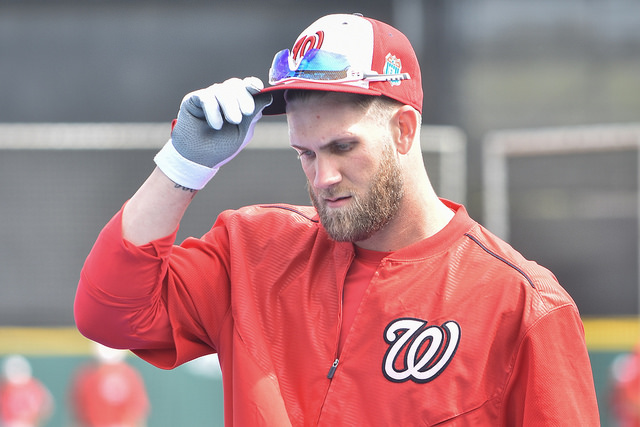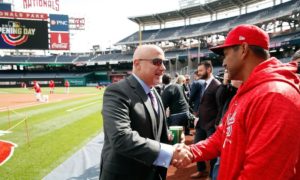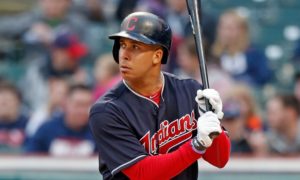The Nationals Should Still Trade Bryce Harper

It’s September 30, and Wrigley Field is on its feet. The crowd is ravenous for the chance to eliminate the Cardinals from the playoffs on the final day of the regular season. The Cubs take a 3-2 lead into the ninth tinning, but closer Pedro Strop walks the leadoff batter. A chorus of boos rain down as the Cardinals’ hired gun, Bryce Harper, steps to the plate…
While this scenario is fiction, it’s not completely impossible. Yes, the Cardinals finish the season with a series in Chicago. The bigger snag is that Harper, the 2015 NL MVP, still plays for the Washington Nationals. Harper is hitting .248/.385/.501 this year, and he’s leading the league in walks with 105. In spite of his production, the Nationals are currently 69-72, eight games behind the Braves in the NL East and nine back of the Cardinals for the second Wild Card spot. They’re eliminated from the playoffs in every way except mathematically.
Harper will be one of the most sought after free agents of the coming winter, and Washington is unlikely to resign him. Megapropsects Juan Soto and Victor Robles are the future for the Nationals, and Harper is already their past. The only reason he’s still playing for them is because the contract says he has to remain with the team for another three weeks. But since he’s already on the way out, the Nationals should extradite his departure. Here are the pros and cons of a mid or late September Bryce Harper trade.
Nationals
Pros
- Prospects- The reason for almost any baseball trade is what you get in return. A rental player for three weeks or less isn’t terribly valuable, especially if he’s ineligible for the playoff roster. (No players added to the 40-man roster after September 1 are playoff eligible.) However, there’s still a good chance they could get a half-decent prospect in return. At the annual Winter Meetings, MLB will conduct it’s annual Rule V draft. The rules are sort of complicated, but the gist is that teams can lose prospects for practically nothing if they don’t add them to the 40-man roster. As a result, lots of teams trade away players they think they’ll lose in the Rule V so they can at least get something in return for them. The Yankees in particular do this all the time. The Nationals actually have an open spot on their 40-man right now, and none of their best prospects are Rule V eligible. They would be a perfect landing spot for a team looking to shed a decent player.
- Money- The other reason why teams shed good players is financial. Harper’s salary is $21,625,000 this year. That works out to $120,138.89 per day, which means he’s still owed more than $2.6M through the end of the season. If another team is willing to pick up the tab, that’s free money for the Nationals.
Cons
- Draft pick- Harper and the Nationals have one more dance to do before he can become a free agent. First, the team must make him a qualifying offer, which is a one year deal for somewhere around $19M. He will inevitably decline this offer, becoming a free agent. However, when he signs with a new team, Washington will receive draft pick compensation. If they trade him, that obviously won’t happen. The draft pick compensation rules are even more complicated than the Rule V rules, but most likely, the Nationals will receive a pick after the fourth round because they failed to get under the luxury tax threshold this year. If they trade Harper, they would need to get a player in return who’s more valuable than a future compensatory draft pick.
- Waivers- The Nationals put Harper through waivers last month (as most teams do with nearly all their players), and he was claimed by a mystery team. They pulled him back, presumably after failing to strike a deal with the claimant. If they want to trade him in September, they would once again have to try to sneak him through waivers.
- Tickets- With the Nationals out of the playoffs, all that’s left to do this year is sell tickets and concessions. With their biggest star sent packing, it’s fair to assume they would lose some attendance revenue.
Receiving Team
Pros
- Bryce Harper- To state the obvious, the receiving team gets Bryce Harper! Putting everything else aside for a moment, why wouldn’t a GM want Bryce Harper for the stretch run? Ignoring compensation and all the other factors, of course you would want him on your team, especially with expanded rosters. While he can’t do much more than cheer-lead in the playoffs, there’s nothing to cheer for in October if you don’t win enough in September.
- Extension talks- Harper is unlikely to sign an extension before hitting free agency, especially since he’s held out this long without engaging in extension talks. Anything could happen though, and if the receiving team wants to make him a sizable offer, perhaps they can prevent him from becoming a free agent at all.
Cons
- (See above: “Nationals, Pros”)- The receiving team would probably have to trade something of value, most likely a Rule V eligible prospect that they might have lost anyway. They would also have to pay Harper’s salary for the remainder of the year. Furthermore, players traded mid-year aren’t eligible for qualifying offers, so they wouldn’t get a draft pick if Harper signs somewhere else in the offseason.
Bryce Harper
Pros
- Pennant race- This should also be obvious, but Harper would go from an under-.500 Nationals team to playoff contender. That’s got to be a lot more fun than playing out the string in Washington.
- Bonus- If the team succeeds enough to make the playoffs, Harper would probably get a little playoff bonus money, even if it’s just a quarter share. Better than nothing though.
Cons
- Villain- Even though this hypothetical trade would be the machination of two front offices, Harper will still probably be vilified for “forcing his way out of Washington.” He’s just one of those guys that everyone loves to hate, but it doesn’t seem to slow him down too much.
Fans
Pros
- Entertainment- Are you kidding? Bryce Harper in Colorado in a playoff race? Or Philadelphia? Or Oakland? Wouldn’t that be awesome? Baseball is theater, and that would be high quality entertainment.
Cons
- None- There’s really no downside for the fans here, unless you want to pound the table about the “purity of the game,” or some archaic nonsense like that. Really, the pros outweigh the cons all the way around, so what are you waiting for, Washington? Let’s make this happen!
-Daniel R. Epstein


















